Dry
Showing 1–24 of 71 results
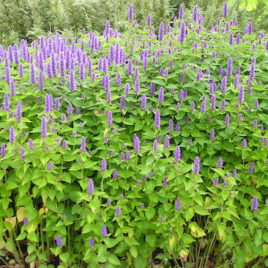
Agastache foeniculum
Agastache foeniculum, or Anise Hyssop, is a 2-3 foot perennial member of the mint family. Anise Hyssop’s leaves produce a strong anise or licorice scent when crushed, and its bluish-purplish flowers appear in July through September. The plant grows in … Continued
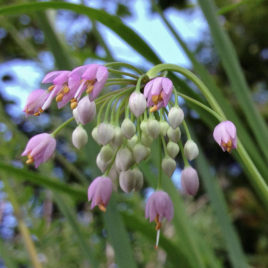
Allium cernuum
Allium cernuum, or Nodding Onion, is a 1-2 foot, attractive allium with white to pink nodding flowers on 2’ stalks. Nodding Onion thrives in full sun to part sun in moderately rich to stony soils from July to August. Plant … Continued
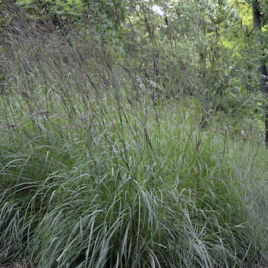
Andropogon gerardii
Andropogon gerardii, or Big Bluestem, is a tall, impressive, warm-season, clump grass. In spring, the grass appears blue-green, and, in summer, it turns green with red tinges. In late summer, the tall grass features a purplish, 3-spike inflorescence resembling a … Continued
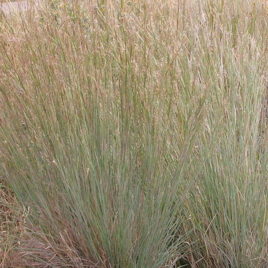
Andropogon scoparium
Andropogon scoparium, or Little Bluestem, is a short warm season clump grass with a dense root system, growing best in average, dry soil and full sun. Once established, Little Bluestem has good drought resistance as it tolerates high heat and … Continued
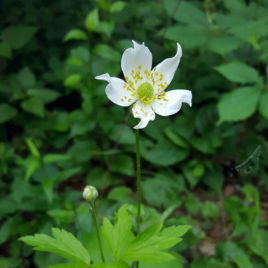
Anemone virginiana
Anemone virginiana, or Tall Thimbleweed, is a 2-4 foot perennial member of the Buttercup family. It grows in full sun to shade and in average to dry soils. Tall Thimbleweed’s leaves are strongly veined with distinct stalks. Tall Thimbleweed produces … Continued
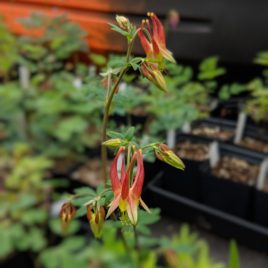
Aquilegia canadensis
Aquilegia canadensis, or Columbine, is a classic woodland wildflower with lacy blue-green foliage and beautiful red and yellow flowers. Hummingbirds flock to its flowers, and it reseeds itself freely.
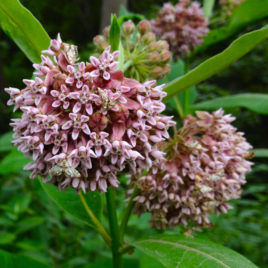
Asclepias syriaca
Asclepias syriaca, or Milkweed, is a herbaceous perennial with pink flowers serving as a great nectar source for butterflies. Its leaves are a food source for Monarch butterfly larvae. Milkweed, or Common Milkweed, is easily grown in average, dry to … Continued
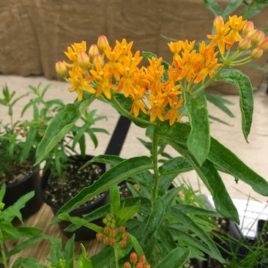
Asclepias tuberosa
Asclepias tuberosa, or Butterfly Milkweed is a 1-2 foot dazzling member of the Milkweed family. Butterfly Milkweed leaves are lance-shaped, and its flowers are a brilliant orange. Preferring dry to medium, well-drained soils in full sun, Butterfly Milkweed appears from … Continued
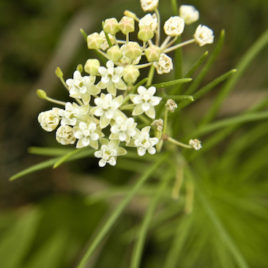
Asclepias verticillata
Asclepias verticillata, or White Milkweed, is a deep-rooted perennial with small greenish-white flowers blooming in small clusters between July to August. The late-blooming milkweed makes it a valuable late-season food source for Monarch butterflies and their caterpillars.
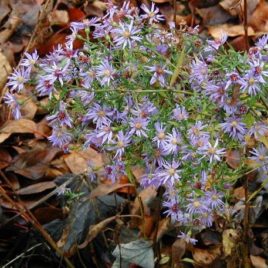
Aster cordifolius
Aster cordifolius, or Blue Wood Aster, is a 2-3 foot perennial for partially shaded sites in dry or moist soil. Blue Wood Aster is often found at the edge of woods with clouds of blue flowers appearing in early fall. … Continued
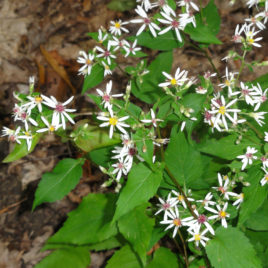
Aster divaricatus
Aster divaricatus, or White Wood Aster, is a low mounding, rhizomatous perennial that is typically the first aster to bloom in late summer. White Wood Aster produces white ray flowers with light pink centers that are sure to brighten your … Continued
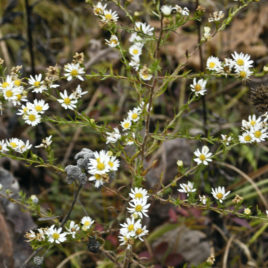
Aster ericoides
Aster ericoides, or Heath (White) Aster, is a 2-3 foot perennial for full sun, well-drained soils. Heath (White) Aster has very prolific tiny white flowers that appear in late summer to early fall. It is also a great butterfly food … Continued
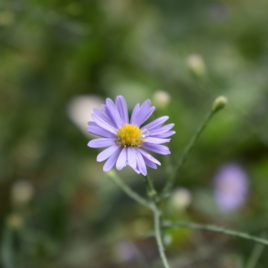
Aster laevis
Aster laevis, or Smooth Blue Aster, is a 2-4 foot hardy perennial for full to part sun and dry to medium moist soils. Smooth Blue Aster has leaves and stems with a pale glaucous bloom and deep blue flowers appearing … Continued
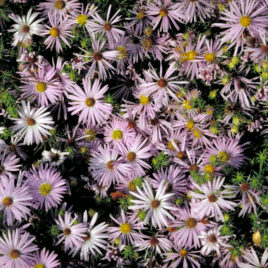
Aster oblongifolius
Aster oblongifolius, or Aromatic Aster, is a 1-2 foot perennial for full sun to part shade and medium to dry, well-drained soils. The perennial is very drought tolerant. The branching stems of Aromatic Aster feature violet flowers with yellow centers … Continued
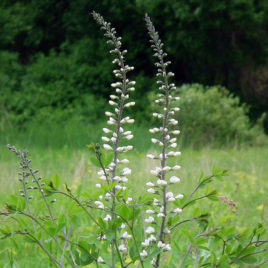
Baptisia alba
Baptisia alba, or White Wild Indigo, is a 2-4 foot, long-lived herbaceous perennial that prefers full to part sun and dry to medium, moist soils. Although White Wild Indigo tolerates poor soils. All Baptisia species are nitrogen-fixing legumes, meaning they … Continued
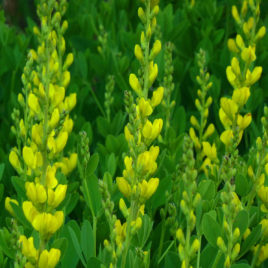
Baptisia tinctoria
Baptisia tinctoria, or Yellow Wild Indigo, is a shrub-like perennial with silvery, gray-green leaves and bright pea-shaped flowers in late spring. The plant grows best in full sun or part sun. Young plants tend to get off to a slow … Continued
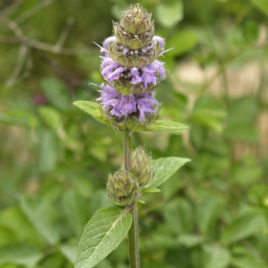
Blephilia ciliata
Blephilia ciliata, or Downy Wood Mint, is a perennial with tight purple flowers stacked on top of each other, reaching up to one foot tall. It thrives in almost any soil from dry to moist and requires full to part … Continued
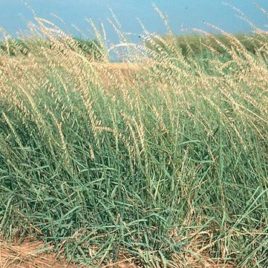
Bouteloua curtipendula
Bouteloua curtipendula, or Sideoats Grama, is short, hardy prairie grass, growing in dry to medium moisture soils and full sun. Side Oats Grama has narrow blue-green foliage with purple flowers appearing in early to mid summer. The leaves turn golden … Continued
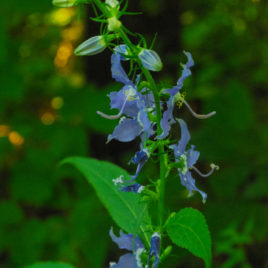
Campanula americana
Campanula americana, or Tall Bell Flower, is a 4-5 foot biennial for full shade to full sun and rich, well-drained, moist soils. Its deep blue flowers appear in July to early September. Tall Bell Flower is found in moist meadows … Continued
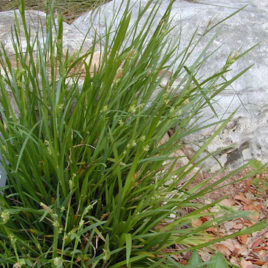
Carex blanda
Carex blanda, or Wood Sedge, is an evergreen, perennial sedge growing in moist to dry soils and part sun or full shade. Wood Sedge displays deep green flower spikes above its leaves in late spring. Wood Sedge offers a low-mounded … Continued
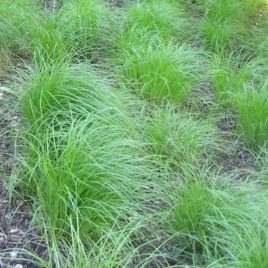
Carex pensylvanica
Carex pensylvanica, or Pennsylvania Sedge, is a perennial sedge that is one of the first to bloom in spring. The sedge is a shade-loving perennial growing in dry to medium soils. Pennsylvania Sedge enjoys upland woodlands, wooded slopes, or sandy … Continued
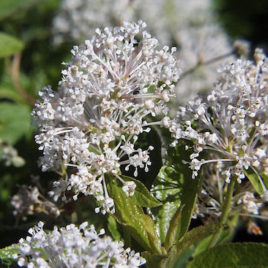
Ceanothus americanus
Ceanothus americanus, or New Jersey Tea, is a 2-3 foot, hardy, perennial, woody shrub for well-drained dry to medium soils in part to full sun. New Jersey Tea produces bright white flowers growing in July through August. Younger plants get … Continued
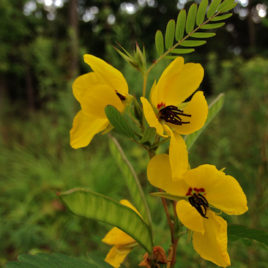
Chamaecrista fasciculata
Chamaecrista fasciculata, or Partridge Pea, is an annual plant with yellow flowers with deep red stamens favored by bees and other pollinators, blooming June to August. Partridge Pea features symmetrical foliage with blue-green leaves that retreat when touched.
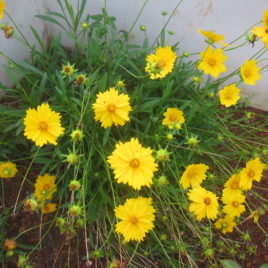
Coreopsis lanceolata
Coreopsis lanceolata, or Lanceleaf Coreopsis, is a 2 foot, tough perennial often used in wildflower mixes. Lanceleaf Coreopsis prefers dry, well-drained soils in full sun to part shade and produces brilliant, yellow, daisy-like flowers from June to July. The plant … Continued

